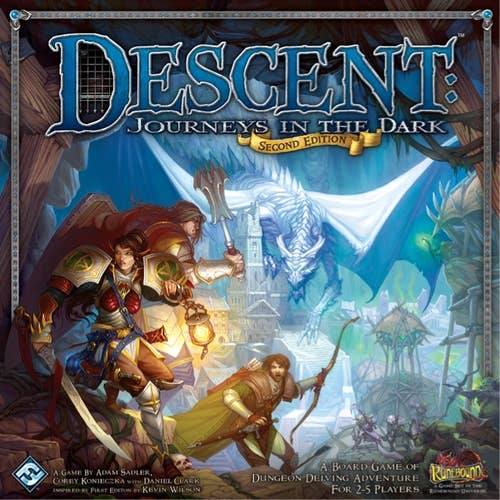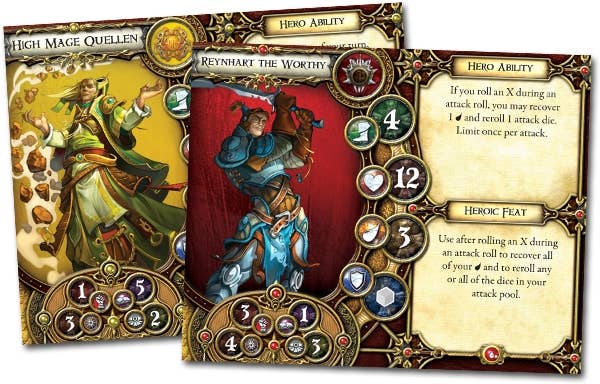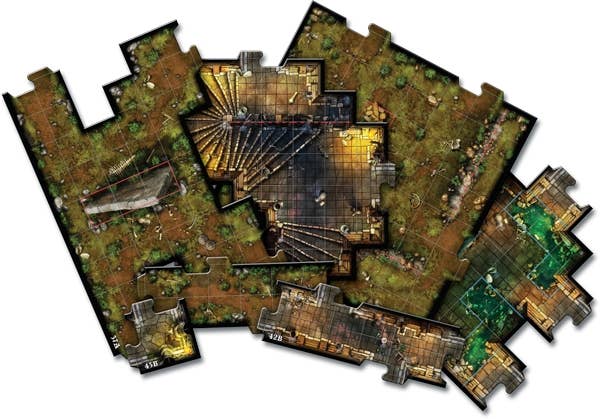BOARDgamer: Journeys in the Dark with Descent
We look at dungeon crawler-cum-tactical skirmish title Descent: Journeys in the Dark, Second Edition, a tabletop game in the vein of Fire Emblem and Final Fantasy Tactics.
This article first appeared on USgamer, a partner publication of VG247. Some content, such as this article, has been migrated to VG247 for posterity after USgamer's closure - but it has not been edited or further vetted by the VG247 team.
I'm a big fan of "dungeon crawler" board games; I have been ever since my then-teenage brother's girlfriend introduced me to Games Workshop and Milton Bradley's HeroQuest way back in the early '90s.
HeroQuest was a simple game with a lot of flaws when examined through a modern lens, but it was fun and enjoyable. It was subsequently followed up by Advanced HeroQuest, which added excellent rules for solo play, random dungeon generation and ongoing, role-playing game-style campaigns, and Warhammer Quest, which streamlined Advanced HeroQuest's sometimes cumbersome mechanics and sprawling randomly-generated dungeons into something a little more focused that also didn't require an "evil" player to function.
More recently, we've seen spiritual successors to HeroQuest and its ilk in the form of the Dungeons & Dragons board games Wrath of Ashardalon, Castle Ravenloft and Legend of Drizzt, all of which are great cooperative games, but by far my favorite modern dungeon crawler is Fantasy Flight Games' Descent: Journeys in the Dark, Second Edition.

Actually, to call Descent a "dungeon crawler" is to do it a bit of a disservice, because unlike the randomly generated, hack-and-slash, loot-grabbing nature of the previously-mentioned games, it's more of an asymmetrical strategic combat game in which a team of up to four hero players take on a single Overlord player across a series of intricately designed scenarios. These scenarios can either be played as one-shot skirmishes or, much more satisfyingly, as part of an interconnected, non-linear campaign in which both the Overlord and the heroes gradually grow in strength as they progress towards the finale. If you want to think of it in video game terms, it's more Fire Emblem than Diablo.
As with most Fantasy Flight Games productions, Descent is a beautiful game stuffed full of high-quality components. Heroes and monsters are represented by well-sculpted plastic miniatures that those with a steadier hand than I will undoubtedly have a lot of fun painting, while other game elements are represented by a combination of cards and tokens. The box can be a bit of a pain to organize -- particularly with the vast stack of interlocking double-sided room and corridor tiles that are used to construct the various scenarios' maps -- but with judicious application of ziplock bags, Tupperware containers and/or home-made tuckboxes for cards, it's possible to cram all the myriad components into the roomy box and be able to set the game up reasonably quickly.
The game itself is highly flexible, catering to a wide variety of play styles. A diverse collection of hero characters are available to play, each of which fits into an archetype that, in turn, has at least two available decks of class cards to choose from. These decks include starting abilities and equipment, plus higher level abilities that can be purchased over the course of a campaign using earned experience points. Every class has its own unique specialisms, and even within the same archetype there are some noticeable differences between the various types of character. This adds a huge amount of replayability to the game, particularly when coupled with the fact that the campaign can unfold in numerous different ways depending on how well both the heroes and Overlord play.

Speaking of the Overlord player, they're not confined to predefined abilities or pre-scripted events, either; instead, each quest tends to give the Overlord a certain degree of choice in which monsters they're able to pit against the hero players, and they may also level up as the campaign progresses, gradually building a deck of cards that specializes in messing with the heroes in numerous different ways. Aggressive Overlords may like to play with the Warlord abilities that buff monsters and do damage; more sneaky Overlords may, conversely, prefer the Saboteur deck, which has some devious trick and traps to play on the heroes when they start to get a bit cocky.
The game's rules are fairly straightforward to pick up, and combat in particular is elegantly handled thanks to some well-designed custom dice. Hits or misses are determined by a blue die which has a single "miss" face and varying amounts of damage on the other faces; various weapons add either yellow or red dice to the mix in varying quantities. Yellow dice don't deal as much potential damage as red, but they're more likely to trigger "surges," which are used to power special abilities for both heroes and monsters; conversely, red dice are the opposite -- they hit harder, but are less likely to be able to trigger special powers. Brown, gray and black defense dice are used in response to the blue, yellow and red attack dice, with each color able to potentially absorb various amounts of damage -- brown being the weakest, and black being the strongest.
The design of the dice means that there's an element of luck and chance to combat without making it feel completely random. Better equipment will always have a better chance of dealing more damage or triggering more special skills because your dice pool will be larger and certain heroes and monsters have abilities that allow them to reroll dice if necessary, but there's always that one-in-six chance of fumbling your attack and missing completely, even on a reroll. This gives a pleasing sense of drama to the proceedings -- much like the aforementioned Fire Emblem can sometimes come down to a not-entirely-guaranteed chance of success against a powerful foe, so too do confrontations in Descent often come down to the wire, with victory for either the Overlord or the heroes rarely being a guaranteed, sure-fire thing until the very end of an encounter.
Speaking of encounters, Descent's base game comes with a wide variety of quests for the two sides to battle over, and very rarely do these boil down to a simple matter of killing everything. In the introductory quest, for example, the heroes are tasked with defeating a powerful Ettin before the Overlord successfully manages to sneak a certain number of goblins past them to attack the countryside beyond; other quests might demand the heroes prevent a powerful necromancer from summoning zombies (which subsequently turn up in the second part of the quest to guard an important NPC) or track down a useful artifact before one of the Overlord's hero-like Lieutenant characters does the same. Rewards for successfully completing quests are always meaningful, too; in the case of quests where the two sides are battling over artifacts, for example, the reward for the quest generally provides the victorious side with a powerful piece of equipment that may be used for the remainder of the campaign.

Descent is an excellent game with a lot of flexibility. The base game's campaign can be replayed numerous times with different combinations of quests each time, and the game has seen several expansions to date, encompassing both small-scale expansions with new heroes and rule tweaks and larger, full-on campaign expansions with a wealth of new adventures to explore. A single run through the base campaign will take an experienced gaming group somewhere in the region of 20 hours of table time to make it through, though for those whose time is a little more precious the game also caters to groups who simply want to play one-shot scenarios, too. And if you want to make your own adventures, you can do so; check out the Quest Vault on the official site for all the tools you need to write your own scenarios.
A traditional dungeon crawler it may not be, but for my money, Descent is one of my favorite games in my collection. Strongly thematic and deeply strategic for both the Overlord and hero players, it's one of those rare games that appeals to fans of both mechanics-focused Eurogames and the more thematic nature of "Ameritrash" titles. If you're a fan of "tactics" games -- or if you just, like me, regularly play with a group that has tastes that straddle that line between mechanics and theme, it's a game well worth adding to your shelf.
